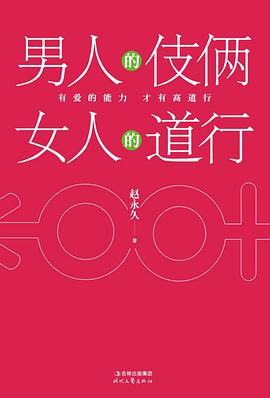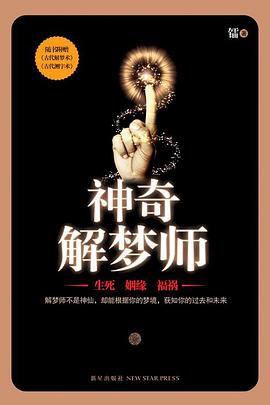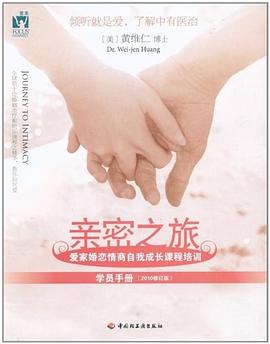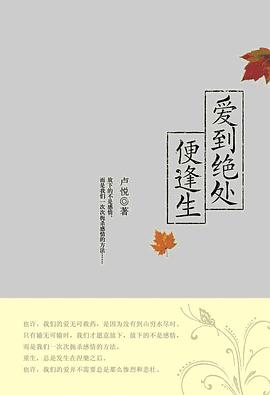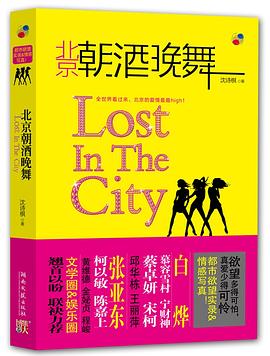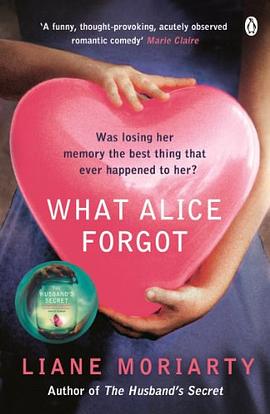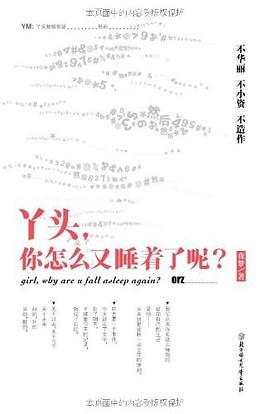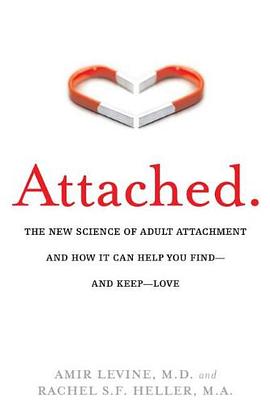

具体描述
We rely on science to tell us everything from what to eat to when and how long to exercise, but what about relationships? Is there a scientific explanation for why some people seem to navigate relationships effortlessly, while others struggle? According to psychiatrist and neuroscientist Dr. Amir Levine and Rachel Heller, the answer is a resounding "yes." In "Attached," Levine and Heller reveal how an understanding of adult attachment-the most advanced relationship science in existence today-can help us find and sustain love. Pioneered by psychologist John Bowlby in the 1950s, the field of attachment posits that each of us behaves in relationships in one of three distinct ways:
*Anxious people are often preoccupied with their relationships and tend to worry about their partner's ability to love them back
*Avoidant people equate intimacy with a loss of independence and constantly try to minimize closeness.
*Secure people feel comfortable with intimacy and are usually warm and loving. In this book Levine and Heller guide readers in determining what attachment style they and their mate (or potential mate) follow, offering a road map for building stronger, more fulfilling connections with the people they love.
作者简介
Amir Levine, M.D. is an adult, child, and adolescent psychiatrist and neuroscientist. He graduated from the residency program at New York Presbyterian Hospital/Columbia University and for the past few years Amir has been conducting neuroscience research at Columbia under the mentorship of Nobel Prize Laureate Eric Kandel. Amir also has a passion for working with patients and it is in this context, while working with mothers and children in a therapeutic nursery, that he first discovered the power of attachment theory. His clinical work together with his deep understanding of the brain from a neuroscientist's perspective contribute to his appreciation of attachment theory and its remarkable effectiveness in helping to heal patients. Amir lives in New York City. Rachel Heller, M.A. studied at Columbia University with some of the most prominent scholars in the field of social psychology. She now works with families and couples as a psychologist in private practice. Rachel lives in Israel.
目录信息
读后感
这是一本很好的恋爱心理学书,强烈建议大家读一下,本书讲解了三种恋爱风格,分析细致到位,对恋爱或将恋爱的人们有很好的指导作用,读这本书后对自己和恋人的感情会有更好的理解,也有利于我们更好的把握爱情,生活的更加幸福快乐!!
评分我是典型的焦虑型,可笑的是我不断地遇见回避型的恋人。我一直以为我是不正常的,于是找来各种各样的心理书籍甚至寻求宗教信仰,以求安抚我那破碎的心,使之归于平静。而此书轻易的将所有的问题解决。若能够在年轻时遇见它,我的人生也许会重写吧。 恋爱就是要亲密,而不是彼...
评分Attachment styles Secure: comfortable with intimacy and are usually warm and loving Anxious: crave intimacy, are often preoccupied with their relationships, and tend to worry about their partner’s ability to love them back Avoidant: equate intimacy with a ...
评分有一句流传很广的爱情诗,“我爱你,不是因为你的样子,而是因为,和你在一起时,我的样子”我虽然觉得读来很美,却一直没有感悟其中的意义。直到经历了一些不幸、或甚幸的故事,又恰逢读了这本教人“如何在未知中相爱,在懂得后相守”的恋爱心理学指南,方才顿悟——我总说自...
用户评价
这本《Attached》真是一次意外的惊喜。我通常不太喜欢阅读那些过于理论化、脱离实际的书籍,但这本书的叙述方式却让我感到非常亲切。作者以一种非常接地气的方式,将复杂的心理学概念娓娓道来,仿佛是一位老朋友在分享她的人生经验。我特别喜欢书中那些生动的案例分析,它们真实地反映了我们在亲密关系中可能遇到的各种困境。读着读着,我常常会联想到自己过去的一些经历,那些曾经让我困惑不解的情感模式,似乎都在书中找到了答案。书中对于依恋类型,比如焦虑型、回避型和安全型,以及它们如何影响我们在恋爱、婚姻中的行为模式,进行了深入的剖析。我惊讶地发现,原来很多看似“不讲道理”的争吵,很多“莫名其妙”的疏远,都可能源于我们内心深处的依恋模式。作者并没有简单地将某种依恋类型“定性”,而是强调了依恋模式是可以改变和发展的。这一点让我看到了希望,也让我开始反思自己是否能够通过一些方法,朝着更健康的依恋模式发展。书中提供的实践性建议,比如如何与伴侣进行有效的沟通,如何处理分歧,如何在关系中找到平衡,都非常有指导意义。我尝试着在日常生活中运用书中的一些小技巧,惊喜地发现,效果确实不错。和伴侣之间的理解似乎增进了不少,一些曾经的摩擦也渐渐消弭。这让我觉得,这本书不仅仅是一本读物,更像是一本“关系宝典”,能够帮助我们提升亲密关系的质量。它让我对爱情有了更深的理解,也让我对如何经营一段长久而美好的关系有了更清晰的认识。我强烈推荐给所有正在经历或渴望经历亲密关系的朋友们,相信你们也会和我一样,从中获益良多。
评分《Attached》这本书,我只能用“震撼”来形容我的阅读体验。作者以一种极其专业却又非常易读的方式,向我揭示了亲密关系背后隐藏的深刻心理机制。我一直以为,感情的起伏只是两个人之间的“缘分”或“性格不合”,但这本书让我看到了更深层次的原因——依恋模式。书中对焦虑型、回避型依恋的描述,让我瞬间联想到自己过去的一些行为,那些曾经让我深感困惑和痛苦的反应,原来都有其根源。作者并没有简单地贴标签,而是深入浅出地剖析了每种依恋模式的形成原因、表现特点以及对亲密关系的影响。她鼓励我们认识到自己的依恋模式,并理解它如何影响我们与他人的互动。更让我感动的是,作者并没有将任何一种依恋模式描绘成“错误”的,而是强调了每种模式都有其存在的合理性,并且都可以朝着更健康的方向发展。书中提供的那些关于如何识别伴侣的依恋信号,如何在关系中建立健康的界限,如何在冲突中寻求双赢的策略,都让我受益匪浅。我尝试着在与家人和朋友的相处中运用这些原则,发现沟通变得更加顺畅,冲突也大大减少。这本书让我不再害怕面对关系的挑战,而是以一种更积极、更理解的态度去面对。它不仅提升了我的情商,更让我对人生有了更深刻的认识。
评分这是一本让我感到“相见恨晚”的书。我一直认为,自己在感情方面缺乏天赋,总是无法顺利地维系一段关系。直到我读了《Attached》,我才恍然大悟,原来我一直都在用错误的方式经营亲密关系。作者的叙述风格非常直接,不回避问题,但也充满了温暖和同情。她用大量的数据和研究作为支撑,却将枯燥的理论转化成易于理解的故事和例子,让我读起来丝毫不会感到疲倦。书中关于依恋理论的阐述,让我对自己的行为模式有了全新的认识。我曾经对伴侣的过度需求,或者对伴侣的疏远,现在都能找到更合理的解释。更重要的是,这本书让我明白,依恋模式并非一成不变,而是可以通过学习和实践来改变的。作者提供的那些关于如何建立更深层次连接、如何处理冲突、如何给予和接受支持的建议,都非常具有可操作性。我开始尝试着在与伴侣沟通时,更加注重倾听和理解,而不是一味地表达自己的需求。令我惊喜的是,伴侣的回应也开始变得更加积极和亲近。这本书让我不再感到孤独和迷茫,它像一盏明灯,照亮了我前进的方向。我开始相信,即使是曾经跌跌撞撞的感情之路,也有可能走向幸福。我强烈推荐给所有在感情中感到困惑的人,这本书一定会给你带来意想不到的收获。
评分《Attached》这本书,可以说是我近年来读到的最具有实践指导意义的心理学读物之一。作者的写作风格非常平实,却又充满了智慧和洞察力。她以一种非常温和的方式,剖析了人类在亲密关系中最容易遇到的困境,并且提供了切实可行的解决方案。我一直以为,自己在感情方面总是“运气不好”,总是遇到“不对的人”。但读了这本书之后,我才意识到,很多时候,问题出在我自己身上,是我固有的依恋模式在作祟。书中对焦虑型、回避型依恋的解读,让我对自己的行为模式有了更深刻的认识。我曾经的患得患失,曾经的若即若离,现在都能找到更合理的解释。更重要的是,这本书让我看到了改变的希望。作者强调,依恋模式并非一成不变,而是可以通过学习和实践来培养更健康的依恋方式。书中提供的那些关于如何与伴侣建立信任、如何有效沟通、如何处理分歧的建议,都非常具有可操作性。我尝试着在实际生活中运用这些方法,效果出奇地好,我和伴侣之间的关系也变得更加和谐。这本书让我不再害怕面对感情中的挑战,而是以一种更自信、更积极的态度去迎接。
评分坦白说,《Attached》这本书的封面设计并没有引起我太大的兴趣,我甚至在书架上犹豫了很久才决定拿起它。然而,一旦我翻开第一页,我就被深深地吸引住了。作者的语言风格非常独特,既有学术的严谨,又不失文学的优美,仿佛是在品一杯醇厚的红酒,越品越有味道。书中的内容让我脑洞大开,颠覆了我许多固有的认知。我一直以为,感情中的一些问题是性格使然,是无法改变的命运。但是,这本书让我意识到,很多时候,这些看似难以逾越的障碍,其实是我们可以通过理解和努力去克服的。书中对依恋理论的阐述,不仅仅是理论层面的介绍,更重要的是它赋予了我们洞察自己和他人的工具。我开始能够理解,为什么有些人在关系中会显得如此“粘人”或“冷漠”,他们的行为模式背后,往往隐藏着我们所说的“依恋需求”。而作者并没有批判任何一种依恋类型,而是强调了理解和接纳的重要性。她鼓励我们认识到自己和他人的依恋模式,并在此基础上寻找更有效的沟通和相处方式。书中提供的那些具体的练习和建议,比如如何识别伴侣的依恋信号,如何在矛盾发生时采取更具建设性的回应,都非常实用。我曾经觉得自己的情感之路异常坎坷,总是在亲密关系中碰壁。但读了这本书之后,我才明白,很多时候,我只是不知道如何去“连接”,如何去“修复”。它教会了我,即使是看似无法弥合的裂痕,也有可能通过细致的呵护和真诚的沟通而愈合。这本书让我不再害怕亲密关系的挑战,反而让我对未来的情感生活充满了期待。我真心感谢作者能够将如此有价值的知识分享给我们,它无疑是我近年来阅读过的最深刻、最有启发性的一本书。
评分《Attached》这本书,我只能用“惊为天人”来形容我的阅读感受。作者以一种极为流畅且富有洞察力的笔触,揭示了亲密关系背后隐藏的科学原理。我一直以为,感情的经营需要天赋,需要所谓的“缘分”,但这本书让我看到了更科学、更可控的路径。书中对依恋理论的阐述,不仅仅是停留在理论层面,而是将其与实际生活中的种种情境巧妙地结合起来。我曾经对伴侣的一些行为感到困惑不解,甚至产生过误解,但读了这本书之后,我才明白,这些行为背后可能隐藏着不同的依恋需求。作者强调,理解比评判更重要,而接纳则是通往健康关系的关键。书中提供的那些关于如何识别伴侣的依恋模式,如何在关系中建立健康的界限,以及如何在冲突中寻求理解和共赢的策略,都让我受益匪浅。我尝试着在与伴侣的互动中运用这些原则,惊奇地发现,我们之间的沟通变得更加顺畅,彼此的理解也更加深入。这本书让我不再对感情感到迷茫和无助,反而让我看到了经营一段幸福关系的可能性。
评分这是一本让我感到“醍醐灌顶”的书。《Attached》的出现,彻底改变了我对亲密关系的认知。作者的叙述风格非常朴实,却又不失深刻的见解。她以一种极其专业且易于理解的方式,将复杂的依恋理论展现在读者面前,让我对自己在关系中的行为模式有了全新的认识。我曾经以为,自己在感情方面总是“不够好”,总是无法维系一段长久的关系。但读了这本书之后,我才明白,很多时候,问题并非出在“不够好”,而是源于我固有的依恋模式在作祟。书中对焦虑型、回避型依恋的深入剖析,让我能够更清晰地看到自己和他人在关系中的需求和恐惧。更重要的是,作者强调,依恋模式并非一成不变,而是可以通过学习和实践来培养更健康的依恋方式。书中提供的那些关于如何与伴侣建立信任、如何有效沟通、如何处理分歧的建议,都非常具有可操作性。我尝试着在实际生活中运用这些方法,效果出奇地好,我和伴侣之间的关系也变得更加和谐。这本书让我不再害怕面对感情中的挑战,而是以一种更自信、更积极的态度去迎接。
评分我一直是个不太善于表达情感的人,尤其是在亲密关系中,我常常感到自己的付出得不到回应,或者我的需求被误解。读了《Attached》这本书,我才明白,很多时候,问题并非出在对方身上,而是源于我自身根深蒂固的依恋模式。作者的叙述方式非常引人入胜,她用大量真实的生活案例,将抽象的心理学理论具象化,让我仿佛亲身经历了那些情感的纠葛。书中对不同依恋类型的分析,不仅精准地描绘了各种模式的特点,更重要的是,它为我们提供了走出困境的路径。我尤其欣赏作者在书中强调的“安全感”的重要性,以及如何通过自身的努力去培养和建立安全感。书中提供的一些关于如何与伴侣进行有效沟通、如何处理分歧、如何在高压环境下保持冷静的建议,都非常具有实践意义。我尝试着在日常生活中运用这些技巧,惊喜地发现,我和伴侣之间的误解少了,理解多了,亲密度也似乎在悄悄地提升。这本书让我不再对亲密关系感到焦虑和恐惧,反而让我看到了经营一段健康、稳定关系的可能性。它让我明白,幸福并非遥不可及,而是可以通过学习和实践来获得的。
评分这本书,我是在朋友的强烈推荐下开始阅读的,起初并没有抱太大的期望,但很快,我就被作者的真诚和专业所打动。《Attached》这本书,就像一位耐心细致的心理咨询师,带领我一步步深入探索自己的内心世界。作者以一种非常易于理解的语言,将复杂的依恋理论展现在读者面前,让我对自己在亲密关系中的行为模式有了全新的认识。我曾经以为,很多情感上的困扰都是“性格使然”,是无法改变的。但是,这本书让我明白,原来很多时候,我们只是被固有的依恋模式所束缚,而这些模式是可以被打破和重塑的。书中对不同依恋类型的深入分析,让我能够更清晰地看到自己和他人在关系中的需求和恐惧。我尤其欣赏作者在书中强调的“安全感”的建立,以及如何通过有效的沟通和互动来培养这种安全感。她提供的那些关于如何处理冲突、如何给予支持、如何在关系中找到平衡的建议,都非常具体和实用。我尝试着在日常生活中运用这些方法,发现我和伴侣之间的沟通质量有了显著提升,一些曾经让我头疼的问题也迎刃而解。这本书让我不再害怕亲密关系的挑战,反而让我对经营一段长久而美好的关系充满了信心。
评分《Attached》这本书,我是在一个偶然的机会下接触到的,当时并没有抱太大的期望,只是觉得内容可能与我近期的生活有所关联。然而,这本书带给我的冲击是巨大的,它就像一把钥匙,打开了我内心深处一直以来被尘封的疑惑。作者以一种非常平易近人的方式,将复杂的依恋理论融入到日常生活的点滴之中,让我感觉仿佛是在听一位经验丰富的长辈在娓娓道来。书中对于不同依恋风格的描述,是如此的生动和贴切,我甚至能在字里行间找到自己曾经的影子。尤其是关于安全型依恋的描绘,让我对理想的亲密关系有了更清晰的认识。我一直以为,所谓的“完美伴侣”是可遇不可求的,但这本书告诉我,与其苦苦追寻一个完美的人,不如先成为一个“安全型”的自己,并努力去经营一段“安全型”的关系。书中提供的那些关于如何培养安全感、如何建立信任、如何在高压环境下保持冷静的建议,对我来说是极具价值的。我尝试着在工作中运用书中关于情绪管理的技巧,效果出奇地好,原本让我头疼的同事关系也得到了改善。更重要的是,这本书让我开始审视自己在亲密关系中的一些固有模式,那些曾经让我痛苦不堪的“轮回”,似乎也有了解释。我明白了,很多时候,我们之所以陷入困境,是因为我们固守着旧有的思维方式和行为习惯。而这本书,则鼓励我们跳出舒适区,去拥抱新的可能性。它让我不再对爱情感到恐惧,而是充满了好奇和探索的勇气。我真的非常感激作者,她不仅给了我知识,更给了我改变的动力和方向。
评分真是造福人类的书和作者啊
评分Audiobook下载:百度云网盘。"I'm an avoidant"
评分心理类书籍一大作用便是帮助人们了解自己了解他人,很多时候问题都在于并不理解对方的行为、出发点、心理过程,多一份理解或许就是多一份包容的可能,倒也并不一定就是为了解决问题。况且很多时候问题其实就只是:你不理解我我不理解你,不是我不想理解你而是我不知道怎么用我自己的方式角度来理解你。
评分了解了不同依恋类型、与不兼容的依恋类型爱人相处的办法。目前来说自己是安全型,要更加妥帖地照顾到焦虑型爱人的特点,去confirm和respond。10/2019在barnes and noble读完。
评分Audiobook下载:百度云网盘。"I'm an avoidant"
相关图书
本站所有内容均为互联网搜索引擎提供的公开搜索信息,本站不存储任何数据与内容,任何内容与数据均与本站无关,如有需要请联系相关搜索引擎包括但不限于百度,google,bing,sogou 等
© 2026 book.wenda123.org All Rights Reserved. 图书目录大全 版权所有


